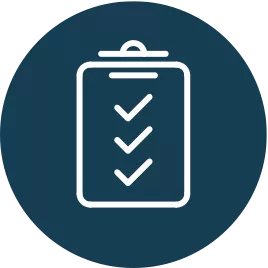Catering Business Checklist
The Caterer Checklist covers key items that you may consider when starting your business. Getting a catering business off the ground can be complex and there are numerous government agencies that you may need to interact with to ensure the health, safety, and well-being of yourself, your team and your customers. Get a head start on the planning process by knowing upfront what to expect so you don't run into surprises that may delay your grand opening.

- Find a Location
-
One of the first decisions you will want to consider is whether you plan to prepare food in your own home or in a rented commercial kitchen. While working out of your private home gives you flexibility, you'll need to meet certain qualifications around what ingredients and equipment you can use, and there are limits on the amount of income you can earn before you will be required to use a commercial kitchen. If you meet these qualifications, you are considered a "cottage food operator" and can use your home's kitchen to prepare, package, store and handle cottage food products. Visit the LA County Department of Public Health website to apply for a Cottage Food Operation permit.
Also take into account City zoning requirements for working out of your home, as there are regulations around the number of deliveries and clients you may have per day to limit the impact of your business activity on your neighbors.
If you don’t meet the requirements for a Cottage Food Operator, you will need to operate from a commercial kitchen that has been approved by the LA County Department of Public Health to meet health and safety standards. There are several options to find a commercial kitchen – you may decide to rent shared or private space from a commercial kitchen for a few hours a week, set up your own commercial kitchen, or rent space from an existing operating restaurant or other business with a licensed kitchen.
- Register your Business
-
Before you open your doors, you will need to register your business, your business name, and business entity. Check out the online start-up guide to get a tailored guide on how to formally register your business with the City, County, State, and Federal Government and get set up to pay business, sales, and payroll taxes.
It may be a good idea to check with a lawyer to consider the types of liability your business might have and determine the best type of legal entity for your catering business.
- Get ready to open
-
If you're planning to work from your home and want to make changes to your kitchen, you may need to apply for a building permit with the Department of Building and Safety. Building permits are required for electrical, plumbing and structural changes to a building, including additions, alterations, construction, and demolition. To obtain a building permit, you will need to file building plans, have them approved, and schedule an inspection to verify the work after it has been completed. Depending on the scale of the project, there are different “plan check” options for LADBS to review your building plans, ranging from an online application and automatic approval for simple projects to an extended review of architectural and structural drawings for large, complex projects.
If you plan to serve alcohol at an event, contact the State of California Department of Alcohol and Beverage Control (ABC) to find out the restrictions and requirements. Depending on if the event is public or private and who is organizing it, you may need to obtain a license.
If you own a restaurant that has a liquor license, you may be able to add your catering business to your existing permit.
Other options to consider if you're unable to obtain an ABC license can be to partner with an existing restaurant for alcohol sales or if it's a private event, consider asking the host to provide their own alcoholic beverages instead of having you provide them.
- Bring on Staff
-
Before you start serving food, you’ll need to obtain a Manager’s Food Safety Certification for yourself and/or a designated employee.
California law requires an on-duty catering employee or manager to have state food safety certification.
All employees who handle food (preparation, storage, or serving) must also take a food safety training course and pass an examination to obtain a Food Handler Card. New employees have 30 days to obtain the permit.
If you are planning to work as a Cottage Food Operator (out of your home instead of a commercial kitchen), you and any other person who prepares or packages the food will need to complete a food processor course within three months of becoming registered and every three years during operation.
Review the Hiring Section for information on additional wage and employment guidelines.
- Additional Resources
-
If you prefer a personal touch to getting your business off the ground check out the Resources Section of the Business Portal. You can find organizations that might be helpful to you along the way or visit one of the City's nine BusinessSource Centers for dedicated, free technical assistance.